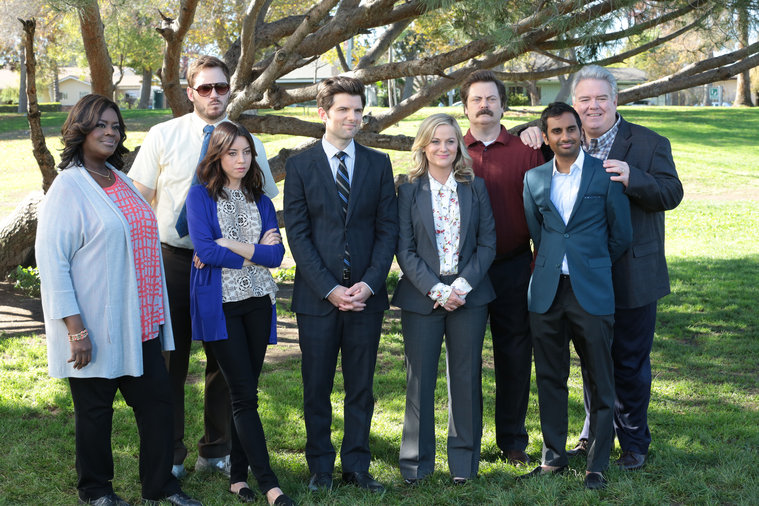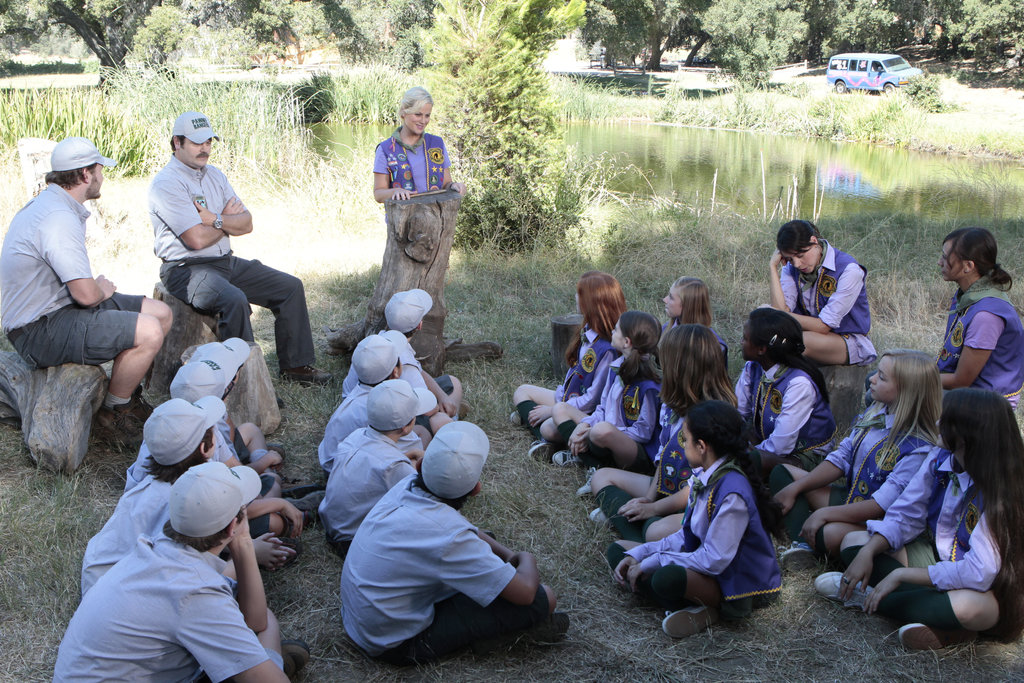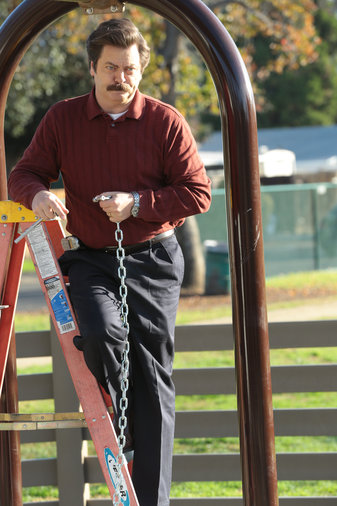Story
Seven Times the Seventh Season of Parks and Recreation Loved Historic Preservation
This spring we said goodbye to the beloved Parks and Recreation, state and local government's favorite TV show possibly ever. Parks and Rec made us laugh for seven seasons and elicited I don’t know how many, “This is exactly what my office is like!” from government workers throughout the country.
Preservation was occasionally a topic on the show—there was that time Leslie tried to prohibit the demolition of a historic gazebo—but in its final season, preservation was the topic of the show. Here are seven times Parks and Rec was an awesome preservationist in the seventh season. Alert: SPOILERS ABOUND!
1. LESLIE TRIES TO CREATE PAWNEE NATIONAL PARK
In the sixth season, Leslie is offered a job with the National Park Service, and while she is elated by the notion, she struggles with what her new role might mean for her community. (Her internal debate in the face of an excellent job opportunity is only one tiny example of how dedicated she is to Pawnee.) Luckily she takes the job and operates the regional headquarters in Pawnee so she can stay connected to her hometown and keep some of her staff. Fast forward a few years and it’s the seventh season. The evil Newport Foundation has decided to sell a big ol' beautiful tract of land they've owned for a century. What a great opportunity for a National Park! Except for one problem—the Newport family is all about the money, and real estate prices in Pawnee are at an all-time high. ("It's time to trade those dumb old trees for a buttload of cash.") The resounding conflict of the seventh season is introduced just moments into the first episode. Let the bidding begin.
2. ANDY AND APRIL BUY AN OLD HOUSE
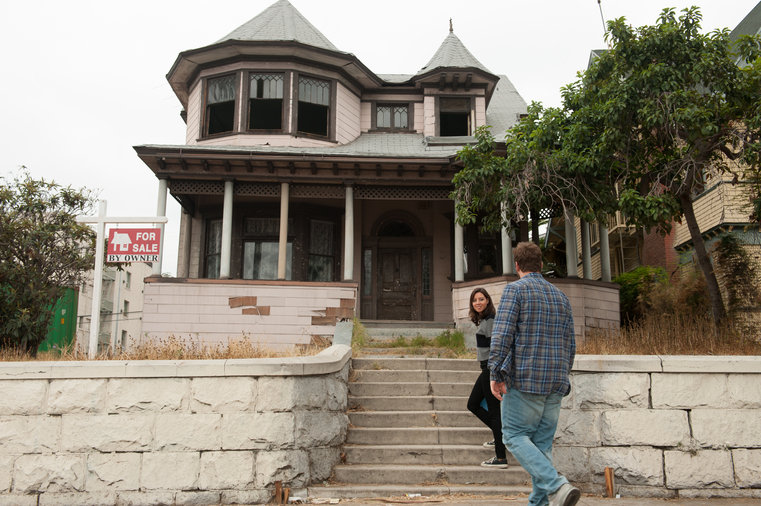
April and Andy buy a supposedly haunted house that was rumored to be the holding house for employees who went insane after working in a doll factory. The house also has a fire pole.
April is at a crossroads. Her last ten years have been "wasted" in a job she simply fell into, and the spontaneity of her life with Andy has all but disappeared. The couple decides to explore new options to spice up their life. They accidentally land on the other side of the tracks, literally ("It's the creepy warehouse district. It's mostly just raccoons and old car batteries.") where they find a dilapidated Victorian two-story that is just weird enough for what they need. It's exciting to see the young couple take on a rehab project, but this decision becomes even more important to preservation in Parks and Rec as the season develops.
3. LESLIE TRIES TO PREVENT COMMERCIAL REZONING FOR THE POTENTIAL NATIONAL PARK PARCEL
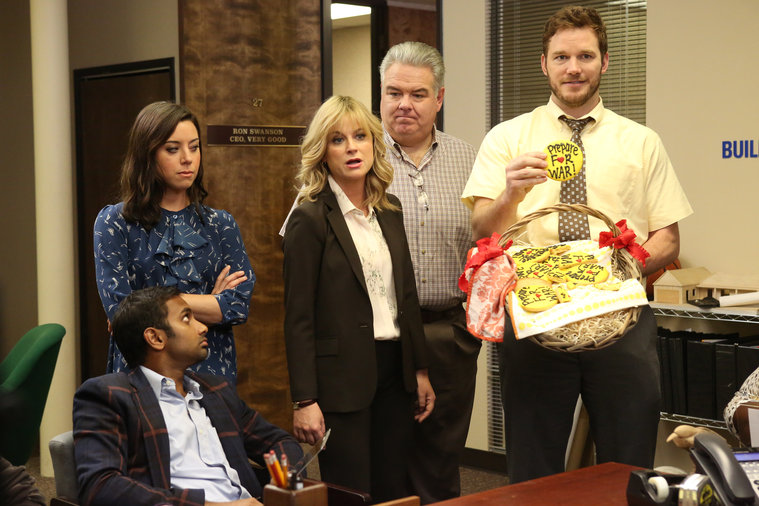
Leslie intimidates her rival, Ron, and his team by dropping off a basket of cookies with icing that reads “Prepare for War.” The “o” in “for” is actually a heart.
Leslie's foil with the National Park project is Grizzyl, the fictional representation of a real-life digital G-monster who intends to build its new headquarters on the pristine Pawnee acres where Leslie imagines a new park. What’s more, her libertarian former bestie Ron Swanson, who is now a private business owner, has partnered with Grizzyl and is as determined to prevent the government from getting the land as Leslie is to attain it. Grizzyl’s bid starts at $90 million, a price NPS obviously cannot match, so Leslie plays politics to try to prevent the rezoning of the land for commercial use. Alas, despite her best efforts, the vote ends in a standstill and nothing gets done to resolve the issue. (Classic Parks and Rec commentary on the total ineffectiveness of government. Sigh.)
4. LESLIE'S TRIES TO USE A HISTORIC PROPERTY TO HALT DEVELOPMENT OF THE PARCEL
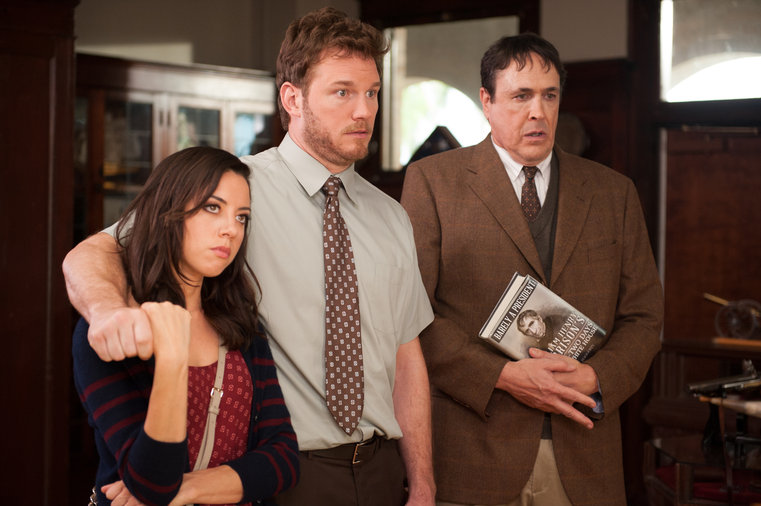
April and Andy work with Leslie and the head of the Pawnee Historical Society to try to get William Henry Harrison’s secret hunting lodge landmarked.
Leslie begins looking for anything that might prevent Grizzyl from developing the land and finds a possible solution in *ta-da!* historic preservation. Leslie meets with head of the Pawnee Historical Society who shares that William Henry Harrison's secret hunting lodge was built on the land so Leslie uses the property as leverage since it could qualify for "historic landmark status" and prevent the development. But alas, the supposed hunting lodge is in ruins so they have to rethink their strategy. (Here's where they really could have used archaeological potential to help them out, but I guess it's not as flashy as a historic artifact scramble.) They hunt down Harrison’s last living descendant, complete an artist rendering of what the cabin may have looked like, and bring in a ton (well, a few) of Old Tippecanoe artifacts to promote her preservation campaign, but Grizzyl foils Leslie's press conference with a celebrity-charged presentation that draws attention away from W.H.H.'s Pawnee legacy. Womp Womp.
5. LESLIE SAVES J.J.’S DINER
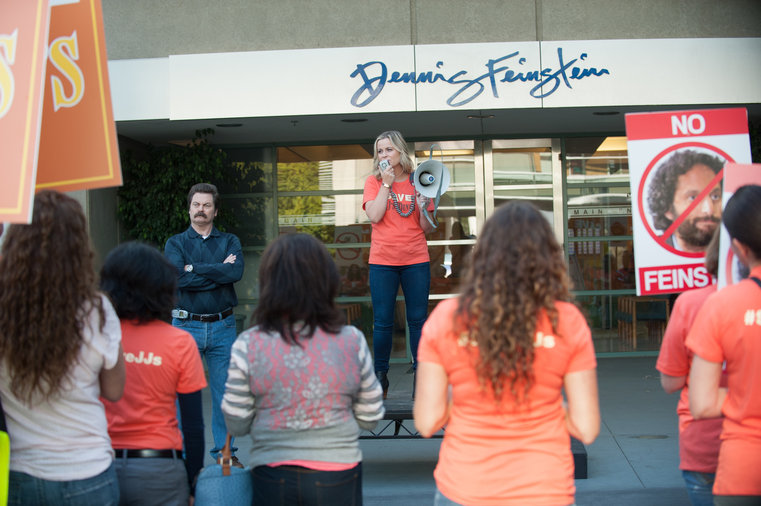
Leslie rallies to save J.J.’s Diner, which was bought by ruthless fragrance mogul Dennis Feinstein.
Despite the discovery that Grizzyl has been data mining information about Pawnee’s residents, Grizzyl acquires the parcel after upping its offer to $125 million. Depressed about the power of corporate money, Leslie takes solace in a meal of waffles at Pawnee's beloved J.J.'s Diner, only to discover her favorite local establishment is about to close. She loves J.J.'s for its local charm and laments the town's gentrification ("We have pressed juice bars and yoga studios and a pet hotel, but I think the town is losing some of its charm. And there's too much kale now.") so the crew holds a public rally to protest its closure. She's almost foiled by a diabolical businessman, but April suggests simply moving J.J.'s Diner to an abandoned building in her and Andy's new neighborhood, which leads to the solution Leslie has been looking for…
6. LESLIE SOLVES THE NATIONAL PARK ISSUE WITH ADAPTIVE REUSE
Ah, the crown jewel of Leslie's ingenuity! It's a preservation solution at its finest. Leslie and Ron (now reconciled) have a lightbulb moment when J.J. insists that his new diner won't thrive in a struggling part of town unless new businesses and residents miraculously appear. Their solution: move Grizzyl into the unused buildings of this neighborhood. It gives NPS the land for the National Park, but it also offers Grizzyl a stronger financial option, despite their recent $125 million investment. "You'll be spending another $100 million at least to construct the building, roads, plumbing, electrical," Ron notes. "Whereas here," Leslie says, "you can take over five entire square blocks of historic Pawnee." The gang lays out construction costs and retail options for Grizzyl, plus the best part, as April notes, is that "the buildings come pre-graffitied." Their donation of the land to NPS offer tax breaks and excellent PR for the corporate giant. "Show people that you're invested in this town," Leslie says. "Start by cleaning up one part of Pawnee and preserving the other." It's an ingenious solution. While the decisions presented certainly open a conversation about gentrification, they also offer preservation as a smart solution for both business and the public good.
7. LESLIE HONORS PUBLIC SERVANTS (AND WHY PRESERVATION IN PARKS AND REC MATTERS)
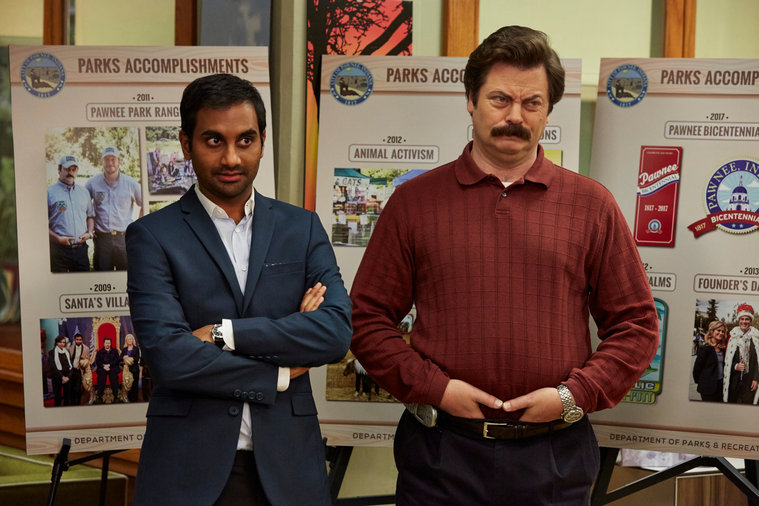
Tom and Ron in front of a board of Pawnee parks accomplishments, including everything from a hosting a successful bicentennial to animal activism.
In the final moments of the series, Leslie speaks to the significance of public service. I'm a sap so it's no wonder it inspired me, but I think even the most cynical of us can agree that this was a rare opportunity to see public service in the limelight. Government employees are often lampooned on comedic television (no more so than on Parks and Rec itself) but few shows take the time to also redeem public service and explore the significance of civic engagement.
When public service is acknowledged on popular television, it’s usually through a drama about law enforcement, politics, or the legal system, not preservation or community revitalization, and sit-coms rarely prioritize it. Seinfeld, the greatest American sit-com of all time, is notoriously about nothing, and even I can’t come up with a good argument against the comedic value of observing minutiae. People watch sit-coms to wallow in the hilarity of everyday life without dealing with any of its consequences; to purposefully make light of all the unfriendly junk we deal with daily; to affirm our observations and rationalize our insecurities. We look for things to feel good about.
Of course, that’s not to say sit-coms are without agenda: All in the Family tackled bigotry, Will & Grace opened up the conversation about homosexuality, and hello, M*A*S*H was set in the Korean War, to name only a few. So particularly up against issues of war and prejudice—and even the oddly innovative power of the concept of “nothing”—Parks and Rec can easily be categorized as another workplace comedy, sprinkled with wacky characters, circuitous plotlines, rhythmic banter, and heartwarming resolutions. But unlike The Office and Ugly Betty and The Mary Tyler Moore Show, Parks and Rec isn’t set in corporate America—it’s set in public America.
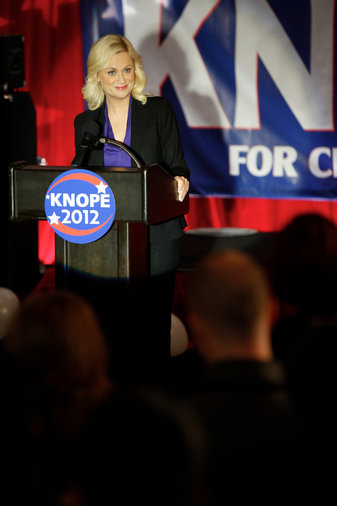
In 2012 Leslie ran for city council and won by 21 votes. The following season she was recalled after making a series of smart decisions that the local citizens unfortunately did not like.
Where The Office showed us Office Olympics born of the crew's apathy and meetings born of Michael's incompetence, Parks and Rec shows us Harvest Festivals born of the gang's (albeit sometimes begrudging) community spirit and city council campaigns born of Leslie's ambition and leadership. Where Ugly Betty fought against a culture of vanity in a high-powered clacking office, Park and Rec fights the people...on behalf of the people...for the good of the people. Where Mary worked against aggressive white men in power, Leslie fights—well, okay, aggressive white men in power (some things in America are universal realities, public and private).
Family sit-coms over the years have looked at middle America’s issues (Roseanne and The Middle immediately come to mind), but Parks and Rec stretches out beyond the single-family perspective to explore the latent humor in community issues that small city America is actually facing, focusing often on the issue of health (“Pawnee has the first documented case of mega-diabetes.”) when not shining light on the actual development and management of parks and the like. What's more, the show then demonstrates actual solutions (or at least attempts at solutions), from meetings with fast food chain Paunch Burger to discuss reducing the sugar content of its gargantuan sodas to Leslie and Ron leading the Pawnee Rangers and the Pawnee Goddesses to get youth involved in their community and in outdoor activities.
It seems I'm getting away from preservation, but my point is: Leslie Knope tackles these issues from the vantage point of her department and shows the holistic community value and potential of something as innocuous as a Parks and Recreation Department. The department is not just about fixing swing sets and offering knitting classes; it's about making a difference for their town, from health to education to its built environment, and that's what preservation is about, too.
The seventh season told its story against the backdrop of corporate takeover, hilariously commenting on the future of our internet mega-giants, hovering over us (literally) with propaganda. Watching it, how many time did you feel like it was the story of your life? How notable, then, that that’s when preservation issues really come into the spotlight—when corporate domination threatens the privacy and sanctity of a smaller community. How special that preservation is the solution to these problems, not the culprit. Leslie Knope shows America that historic preservation is a viable, economic strategy fit for the future. It's a method that works for the big guy and the little guy.
I’m from the Washington, DC, suburbs, debatably one of the most barren wastelands of community spirit on the eastern seaboard. When I was a teenager, I believed it was a privilege not to have grown up in a small town like my parents did. My mom would lament the process of finding a mechanic or contractor she could trust, frustrated she couldn’t wander down to Mr. Jones’ shop for a reliable estimate. My brothers and I would sigh with relief that we lived in one of the biggest metropolitan areas in the country, ignoring the benefits that an actual community (and not a string of strip malls) can provide.
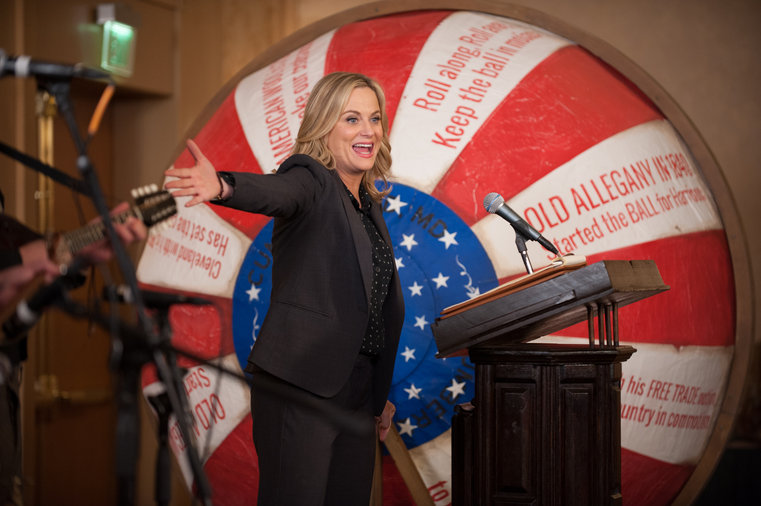
Leslie at her William Henry Harrison press conference showing her endless enthusiasm and passion.
There weren’t any Leslie Knopes when I was growing up to remind us that the future of America lies in the efforts of our smaller communities and our smaller cities. Though, I suppose, one might argue that we Millennials didn't need one; the vacuous suburbs were lesson enough. List after list shows that nowadays we aren’t moving to LA and New York; we’re moving to Buffalo, Cleveland, Denver, Portland, Detroit, Austin. So for those of us out there now as adults trying to make a difference, Parks and Rec offers a ton of validation that what we’re doing to build communities is significant, and I hope this notion inspires youth out there to get involved in their towns, too.
I don’t know how historic preservation ended up so prevalently in the seventh season of Parks and Rec, but I do know it has unwittingly become one of our strongest advocates in pop culture. And hopefully, somewhere there is a precocious tween making binders and scrapbooks planning her campaign for city council, and I can’t thank you enough, Leslie Knope, for inspiring her to do so.

